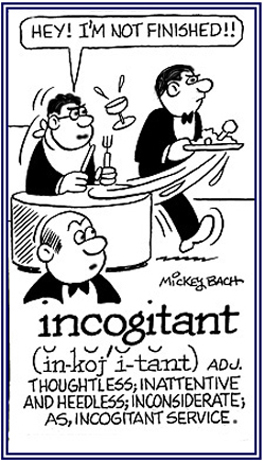ag-, agen-, act-, agi-, agit-
(Latin: to set in motion, to hurry, to shake; to drive; to do, to act; to lead, to conduct, to guide)
1. A condition characterized by excessive restlessness and movement: Some students in school have a problem of hyperactivity in that they cannot sit still and seem to be quite nervous, uneasy, jittery, and therefore disrupt the lessons and concentration of the other students.
2. A higher than normal level of activity: Susan showed a high degree of hyperactivity at the dinner table that evening with an excessive amount of talking and fidgeting.
2. A higher than normal level of activity: Susan showed a high degree of hyperactivity at the dinner table that evening with an excessive amount of talking and fidgeting.
A body organ can be described as hyperactive if it is more active than normal and a person's behavior can also be considered as hyperactive.
People who are affected by hyperactivity always seem to be in motion. They can't sit still. They may dash around or talk incessantly. Sitting still through a lesson can be an impossible task. They may roam around the room, squirm in their seats, wiggle their feet, touch everything, or noisily tap a pencil. They may also feel intensely restless.
inact (verb), inacts; inacted; inacting
To cause an action to take place; to bring into a condition of activity: In the election, most of the voters were against a law to inact an increase in taxes.
A lack or absence of activity or labor; inertness: Joe spent a day of inaction doing absolutely nothing and enjoyed sleeping and resting on the sofa.
inactivate (verb), inactivates, inactivated, inactivating
To release from military service or to remove from the active list of a military service: Mark's leg injury was so severe that his superior officer was forced to inactivate him.
inactive (adjective), more inactive, most inactive
1. Regarding something that is temporarily or permanently not operating: Lynn's user account is inactive at the moment, and if she doesn't use it within a certain amount of time it will be deleted.
2. Concerning a person or animal that is not taking part in a physical pursuit: Some animals are inactive in the winter and hibernate until spring time.
3. Referring to a person who is retired from his or her job: When Mrs. Low turned 62, she decided to be pensioned off or become inactive in her place of work.
2. Concerning a person or animal that is not taking part in a physical pursuit: Some animals are inactive in the winter and hibernate until spring time.
3. Referring to a person who is retired from his or her job: When Mrs. Low turned 62, she decided to be pensioned off or become inactive in her place of work.
inactively (adverb), more inactively, most inactively
Regarding how a person is sluggish or without motion: Jack stood inactively next to the checkout counter and didn't notice when it was his turn to pay for his groceries.
The absence of motion, pursuit, or power to do something: The population blamed the government for its inactiveness in trying to save the natural environment in the country.
Idleness, passiveness: Mary's cat enjoyed lots of inactivity during the daytime by being lazy and sleeping many hours a day on the sofa in the living room!
The character of being unthinkable; the incapability of being thought: The tragic accident of Jenifer's mother produced an incogitability and powerlessness for Jenifer even to envisage and turn it over in her mind.
A lack of thought or the power of thinking: It must be true that rocks and sand are always in a state of incogitance.
1. The deficiency of thought or reflection; thoughtlessness, heedlessness, negligence; inadvertence: Tom was in a state of incogitancy after he had drunk too much alcohol and drove home in his car.
2. The lack of the faculty of thought: Incogitancy is not part of the life of a tree or bush!
2. The lack of the faculty of thought: Incogitancy is not part of the life of a tree or bush!
incogitant (adjective), more incogitant, most incogitant
1. Thoughtless; unthinking; characterized by want of thought; inconsiderate: It was very incognisant of Jane to throw the chewing gum wrappings out of the car window and therefore pollute the environment.
2. Referring to a person who does not posses the mental ability of thinking or acting: Since little Timmy was only 2 years old, his incognisant behavior towards his older brother could be excused.

© ALL rights are reserved.
Go to this Word A Day Revisited Index
2. Referring to a person who does not posses the mental ability of thinking or acting: Since little Timmy was only 2 years old, his incognisant behavior towards his older brother could be excused.

Go to this Word A Day Revisited Index
so you can see more of Mickey Bach's cartoons.
incogitantly (adverb), more incogitantly, most incogitantly
Unthinkingly, thoughtlessly, without consideration or reflection: While driving his car, Doug incogitantly threw his cigarette out of the car window.
incogitative (adjective) (not comparable)
Referring to the lack of the power of thought; destitute of the thinking faculty:: Fruit and mushrooms are incogitative forms of life.
The absence or deficiency of the power of thinking: Trees and mountains, for example, are things that are always in a state of incogitativity.


